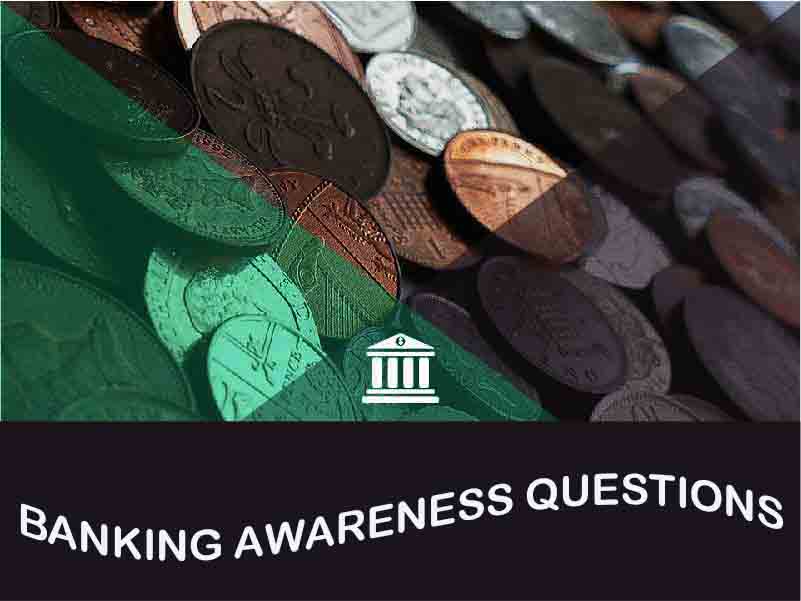Banking Questions Set 34
Banking Questions are very important for all banking exams. In every banking exam like IBPS PO, IBPS Clerk, SBI PO, SBI Clerk, IBPS RRB PO, IBPS RRB Clerical, RBI etc. over 12 questions from banking are asked. Most of the banking questions asked in such exams are either related to fundamental banking or related to current affairs. We are here with the list of 10 banking questions.
Q1. Bharat BillPay transaction can be initiated through multiple payment channels like–
(a) Internet Banking
(b) Mobile-Banking
(c) Point of Sale terminal
(d) Mobile Point of Sale terminal
(e) All of the above
S1. Ans.(e)
Sol. Bharat BillPay transaction can be initiated through multiple payment channels like Internet, Internet Banking, Mobile, Mobile-Banking, POS (Point of Sale terminal), Mobile Wallets, MPOS (Mobile Point of Sale terminal), Kiosk, ATM, Bank Branch, Agents and Business Correspondents.
Q2. Which of the following is not an objective of IMPS?
(a) To facilitate mobile payment systems already introduced in India with the Reserve Bank of India Mobile Payment Guidelines 2008 to be inter-operable across banks and mobile operators in a safe and secured manner
(b) Making payment simpler just without the mobile number of the beneficiary
(c) To enable bank customers to use mobile instruments as a channel for accessing their banks accounts and remit funds
(d) To build the foundation for a full range of mobile-based Banking services
(e) To sub-serve the goal of Reserve Bank of India (RBI) in electronification of retail payments
S2. Ans.(b)
Sol. Objectives of IMPS is given below-
1. To enable bank customers to use mobile instruments as a channel for accessing their banks accounts and remit funds
Making payment simpler just with the mobile number of the beneficiary
2. To sub-serve the goal of Reserve Bank of India (RBI) in electronification of retail payments
3. To facilitate mobile payment systems already introduced in India with the Reserve Bank of India Mobile Payment
4. Guidelines 2008 to be inter-operable across banks and mobile operators in a safe and secured manner
5. To build the foundation for a full range of mobile based Banking services.
Missiles Launched by India Till Date
Q3. MMID is a ____________ digit unique number issued by the bank upon registration.
(a) 7 digits
(b) 8 digits
(c) 9 digits
(d) 6 digits
(e) 4 digits
S3. Ans.(a)
Sol. Mobile Money Identifier (MMID) is a seven-digit unique number issued by the bank upon registration.
Q4. MMID stands for-
(a) Mobile Money Interface
(b) Mobile Management Identifier
(c) Mobile Money Identifier
(d) Mutual Money Identifier
(e) Mobile Money International
S4. Ans.(c)
Sol. MMID stands for Mobile Money Identifier.
Banking Awareness Questions Related to JAIIB AND General Banking
Q5. *99#, a USSD based mobile banking service of NPCI was initially launched in-
(a) November 2010
(b) November 2012
(c) November 2011
(d) November 2013
(e) November 2015
S5. Ans.(b)
Sol. *99#, a USSD based mobile banking service of NPCI was initially launched in November 2012.
Q6. The rural co-operative credit system in India is primarily mandated to ensure the flow of credit to-
(a) women sector
(b) Industries sector
(c) Corporate sector
(d) Agriculture sector
(e) All of the above
S6. Ans.(d)
Sol. The rural co-operative credit system in India is primarily mandated to ensure flow of credit to the agriculture sector. It comprises short-term and long-term co-operative credit structures.
Banking questions related to loans and general banking
Q7. The short-term co-operative credit structure operates with a __________ tier system.
(a) three
(b) four
(c) two
(d) six
(e) one
S7. Ans.(a)
Sol. The rural co-operative credit system in India is primarily mandated to ensure flow of credit to the agriculture sector. It comprises short-term and long-term co-operative credit structures. The short-term co-operative credit structure operates with a three-tier system – Primary Agricultural Credit Societies (PACS) at the village level, Central Cooperative Banks (CCBs) at the district level and State Cooperative Banks (StCBs) at the State level.
Q8. PACS is a basic and the smallest co-operative credit institution in India It works on the grassroots level (gram panchayat and village level). What is the full form of PACS?
(a) Primary Agricultural Credit Sector
(b) Primary Agricultural Credit Service
(c) Primary Agricultural Credit Societies
(d) Primary Agricultural Credit Scheme
(e) Primary Agricultural Credit System
S8. Ans.(c)
Sol. PACS stands for Primary Agricultural Credit Societies.
Banking Questions related to Nominations
Q9. PACS are outside the purview of the _________________ and hence not regulated by the Reserve Bank of India.
(a) The Societies Registration Act, 1860
(b) National Bank for Agriculture and Rural Development Act, 1981
(c) Securities and Exchange Board of India Act, 1992
(d) Reserve Bank of India Act, 1934
(e) Banking Regulation Act, 1949
S9. Ans.(e)
Sol. The rural co-operative credit system in India is primarily mandated to ensure flow of credit to the agriculture sector. It comprises short-term and long-term co-operative credit structures. The short-term co-operative credit structure operates with a three-tier system – Primary Agricultural Credit Societies (PACS) at the village level, Central Cooperative Banks (CCBs) at the district level and State Cooperative Banks (StCBs) at the State level. PACS are outside the purview of the Banking Regulation Act, 1949 and hence not regulated by the Reserve Bank of India. StCBs/DCCBs are registered under the provisions of State Cooperative Societies Act of the State concerned and are regulated by the Reserve Bank. Powers have been delegated to National Bank for Agricultural and Rural Development (NABARD) under Sec 35 A of the Banking Regulation Act (As Applicable to Cooperative Societies) to conduct inspection of State and Central Cooperative Banks.
Q10. State Cooperative Banks/District Central Cooperative Banks (StCBs/DCCBs) are registered under the provisions of State Cooperative Societies Act of the State concerned and are regulated by-
(a) NABARD
(b) RBI
(c) SEBI
(d) Government of India
(e) State Government
S10. Ans.(b)
Sol. StCBs/DCCBs are registered under the provisions of State Cooperative Societies Act of the State concerned and are regulated by the Reserve Bank. Powers have been delegated to National Bank for Agricultural and Rural Development (NABARD) under Sec 35 A of the Banking Regulation Act (As Applicable to Cooperative Societies) to conduct inspection of State and Central Cooperative Banks.
























